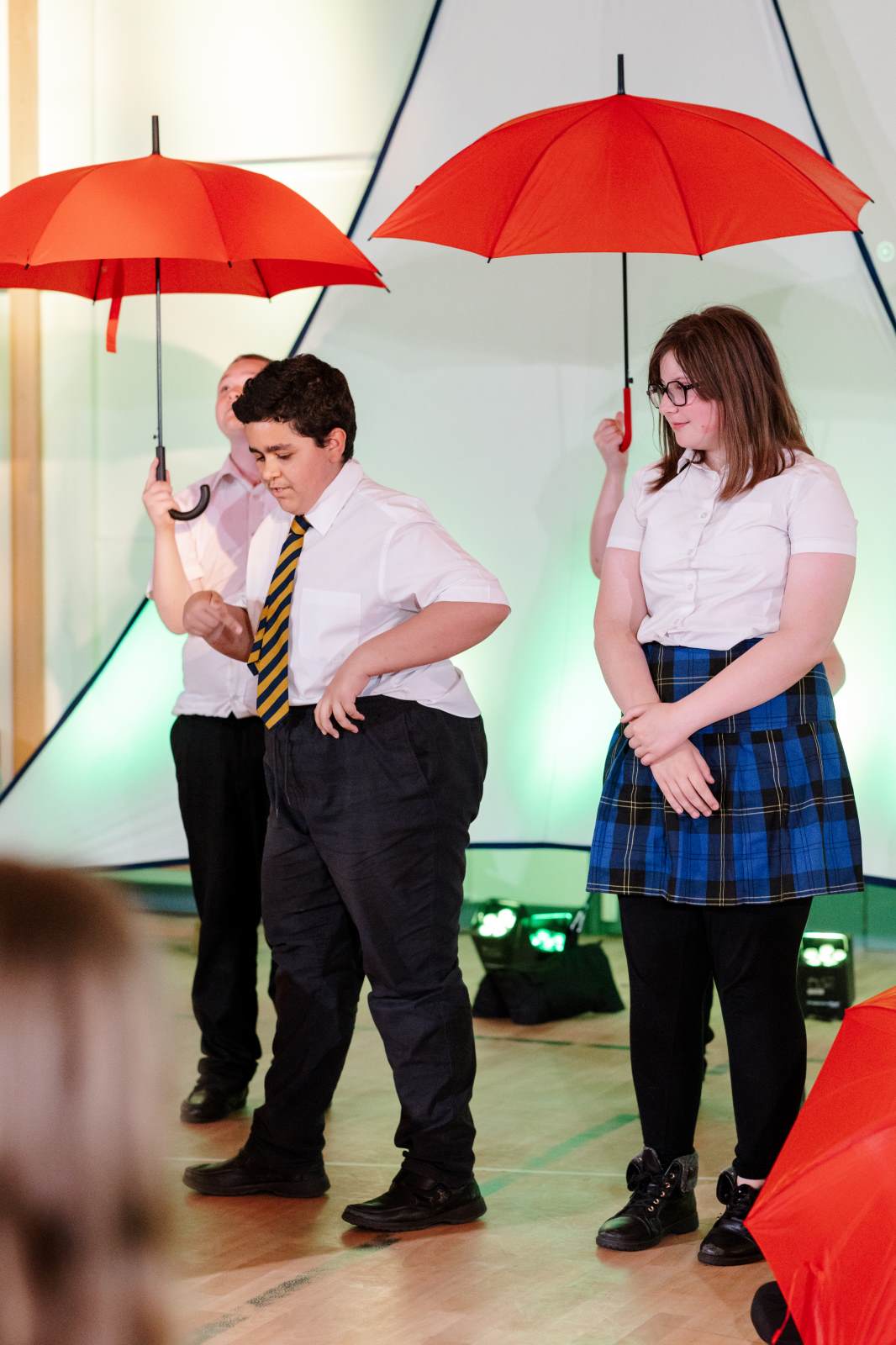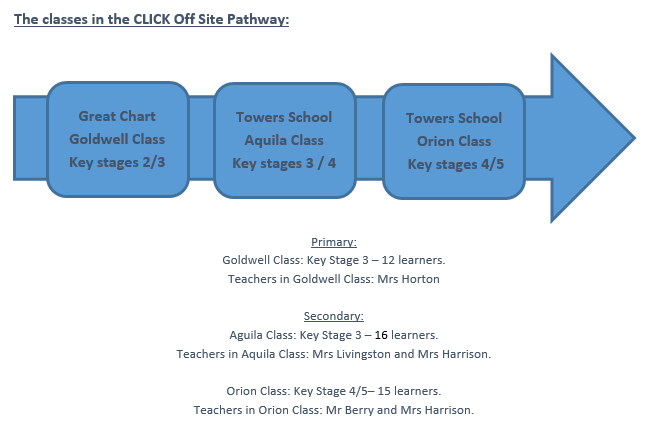CLICK off-site


What is the CLICK Pathway?
A modified National Curriculum emphasising individual need, preparing learners for life beyond Wyvern. The CLICK Pathway utilises an adapted National Curriculum which is studied by students who access our off-site satellite provisions, based at Towers Secondary school and Great Chart Primary school.
The Learners in the CLICK Off Site Pathway:
Learners in the CLICK Off Site Pathway are aged between 8-19, spanning across Key stages 2, 3 and 4 and 5. This pathway serves students with Autism Spectrum Disorder (ASD) as their primary area of need. However, it is important to note that many of our learners also present with additional challenges arising from conditions such as ADHD, mild to severe learning difficulties, sensory impairments, and anxiety.
Students who attend either the primary or the secondary satellites have their own classrooms which are separate to the mainstream schools they are situated in. We encourage our students to socialise with the mainstream students by creating opportunities for inclusion, whilst securing them a safe environment which they are comfortable in. The primary pupils start off by attending assemblies and share playtimes together in order to build on their social skills. They then build on some inclusion within lessons such as Physical Education. Almost all of our primary students move on to the Secondary Satellite, but some return for secondary education to the main site. Decisions are very carefully made and consider individual needs.
At the Secondary Satellite the students have individual timetables which have the flexibility of them being able to be integrated into one of the mainstream classes. Whilst attending this inclusion they are accompanied by our support staff and they are fully integrated into the learning environment for the lessons they attend. Students are encouraged to work hard, to have ambition and to aim towards achieving accreditations and increased confidence in order to prepare them for their future beyond education.

Students are ready to join our pathway when:
Learners in the CLICK Main Site Pathway may meet specific baselines that may elicit discussions with families to facilitate a transition into the CLICK Off Site Provisions. When learners are excelling above their subject learning outcomes, learners may then be selected to attend the CLICK Off Site provision where there are opportunities for them to access mainstream resources and lessons.
If we feel that learners are ready we will discuss options with parents, invite parents and the pupils for a tour of the school and we will hold a parents meeting. We will continue to monitor progress and suitability to the offsite provisions and will consider bringing the pupil back to the Wyvern site if the pupil is not coping. All our pupils remain on roll at the Wyvern School and are supported by Wyvern staff.
What being prepared for adult life means in our pathway:
In the secondary phase of the CLICK Pathway, being prepared for adult life is a comprehensive process aligned with the Preparing for Adulthood Framework. This preparation encompasses several dimensions:
- Independence: Our curriculum empowers students with practical life skills, including self-care, time management, and effective problem-solving. We aim for students to gain the necessary independence for daily living.
- Communication: Learners develop effective communication skills, ensuring they can express themselves, understand others, and confidently engage in various social and professional contexts.
- Knowledge: The curriculum provides students with a deep and varied understanding of subjects, equipping them with knowledge to navigate the world effectively.
- Leadership: We foster leadership skills, enabling students to make informed decisions, set examples, and contribute positively to their communities.
- Confidence: Our approach cultivates self-confidence, empowering students to pursue their aspirations, build meaningful relationships, and actively participate in society.
- Employability: Secondary students are exposed to employability skills, preparing them for potential vocational pathways and work opportunities.
Preparing learners for adult life is explicitly and implicitly taught throughout the CLICK Curriculum. Whether that might be explicit teaching through the Independent Living Skills lessons, or implicitly through Mathematics lesson that utilise the skills required to visit shops and budget for meals and other functional activities.
Intent:
To prepare learners for life beyond Wyvern;
Our intent is clear: to provide a high-quality education that not only equips learners with knowledge but also nurtures them into well-rounded individuals. We believe in cultivating qualities that go beyond academic excellence, aligning with our school values: "Spread Happiness, Connect as a Community, Be Independent, and Show Respect."
Example of learning time allocated - Goldwell class
Examples of Learning Objectives
Topic Cycles
Topic Cycles in the CLICK Pathway contain carefully selected topics that not only aim to introduce learners to an engaging and purposeful curriculum, but the topics reflect some of the cultural and interests of our learners. The topics aim to reflect our learners and their needs.
Both Primary and Secondary follow a five-year rolling series of Topic Cycles. These present as Cycles A, B, C, D and E. We are currently on Cycle A. See example below:
Approaches to Learning
Impact
Assessments used and how we use them
Assessment cycles:
- Learners in the pathway have EHCP targets updated every October, February and June.
- Primary CLICK off-site assess Maths and English once every two terms using The Wyvern reading and writing framework and Maths framework.
- Secondary CLICK off-site assess Maths and English either once every two terms using the Wyvern reading and writing framework or for the more able students assessments take place according to the entry level requirements of the provider they are following. Pupils also have practice assessments in order to prepare them for final assessments.
- Accelerated readers star reading assessments performed at the beginning of September and at the end of every term for both primary and secondary.
- At the beginning of the Academic year, Read Write Inc assessments made for primary and Fresh Start assessments completed for secondary.
What being prepared for adult life means to the pathway.
Being prepared for adult life in the CLICK Pathway means equipping learners with the essential skills and knowledge they need to navigate the challenges and opportunities that await them beyond school. This preparation is deeply rooted in the pathway's core values: Confidence, Leadership, Independence, Communication, and Knowledge.
In Goldwell Class (Primary), it involves fostering a love of learning and curiosity about the world. Learners are encouraged to explore and understand their immediate environment, build foundational academic and life skills, and develop their social and communication abilities. The emphasis is on creating a strong foundation that promotes independence, self-confidence, and the ability to engage with the community.
As students transition to secondary (either offsite or onsite Click), being prepared for adult life becomes more focused. The curriculum aligns with the Preparing for Adulthood framework, which includes areas such as employment, independent living, health, community inclusion, and lifelong learning. Students are guided in developing practical skills like budgeting, cooking, and personal care, as well as social and communication skills to engage with others effectively.
Moreover, the pathway places importance on developing self-advocacy and leadership skills, empowering learners to express their needs, make informed decisions, and take an active role in their communities. The focus is on nurturing their self-confidence and providing opportunities for them to explore their interests and talents.
Overall, being prepared for adult life in the CLICK Pathway means offering an holistic education that combines academic, practical, and social learning experiences. It aims to build well-rounded individuals who are not only equipped with essential life skills but also possess the confidence and independence to thrive in the wider world, fostering a sense of belonging, inclusion, and meaningful contribution to society.
Accreditations.
Work on accreditations begins at the earliest point at Secondary in the CLICK Pathway. Accreditations studied are:
AQA English Entry Level - Step up to English
NOCN English Functional Skills
OCR Geography Entry Level
OCR History Entry Level
NOCN Certificate/Diploma - Independent living
NOCN Certificate - Employability
Inclusion: English Language GCSE/ Science GCSE/BTEC Art/City & Guilds Catering & Hospitality.
In other subjects, those in Year 11 work towards AQA ELC. Subjects include Geography and History.
Additionally, students across the pathway can work towards an Arts Award.
CLICK off site - Results and Predicted Grades Optional Subjects.
CLICK off site - Results English and Maths.
Reading.
1. The teaching of reading : We will use the Read Write Inc. programme and Fresh Start for our Secondary Classes (Aquila and Orion) to teach phonics effectively.
2. Guided Reading Sessions: Guided reading sessions must be included in weekly planning. These sessions cater to the individual reading needs of our students.
3. Comprehension Activities: Regular comprehension activities are mandatory. They must align with students' reading levels and be used to assess their understanding of texts.
4. Inclusivity: Every reading session should account for diverse reading abilities and preferences. Teachers must provide support for students with different reading profiles.
Mathematics Non-Negotiables at The Wyvern – CLICK Pathway
1. Foundations of Mathematical Thinking: We recognise that mathematical development begins with practical experiences. As such, mathematics within the pathway always starts from a practical basis, progressing to pictorial and then abstract levels as students are ready.
2. Language and Mathematics: The language associated with mathematics and numeracy is inseparable from the concepts and skills themselves. We are committed to teaching mathematical language alongside new concepts to support comprehension and expression.
3. Integration into Everyday Life: Mathematics is an integral part of daily life, and our teaching aims to reflect this reality. We provide opportunities for learners to practice and embed their skills in practical, functional contexts, ensuring they can apply their knowledge in a relevant and purposeful manner.
4. Multi-Sensory Approach: Many of our students have specific learning difficulties that affect language and maths concept acquisition. We employ a universal approach using visual supports and simple language to aid comprehension, communication, and problem-solving.
5. Generalisation of Skills: Students may struggle with transferring skills to new contexts. We ensure that they have repeated opportunities to consolidate skills in different situations, fostering the ability to apply knowledge across various experiences.
6. Progressive Learning: Our teaching process progresses from sensory beginnings, through counting, symbolic representation, abstract thinking, and the introduction of addition and subtraction. Mathematical development arises from daily experiences in an engaging environment.
7. Contextual and Practical Learning: Mathematics is best taught practically, contextually, and concretely. We incorporate mathematics into art, games, cooking, and other aspects of daily life to enhance motivation and understanding.
Mathematics in the CLICK Pathway:
1. Discrete Mathematics Lessons: Students in the CLICK Pathway receive discrete mathematics lessons based on an adapted National Curriculum. These lessons incorporate a range of manipulatives, such as Numicon, to facilitate understanding.
2. Practical Application: Teachers plan opportunities for students to apply mathematical skills in practical and age-appropriate ways, ensuring that learning is meaningful and relevant.

